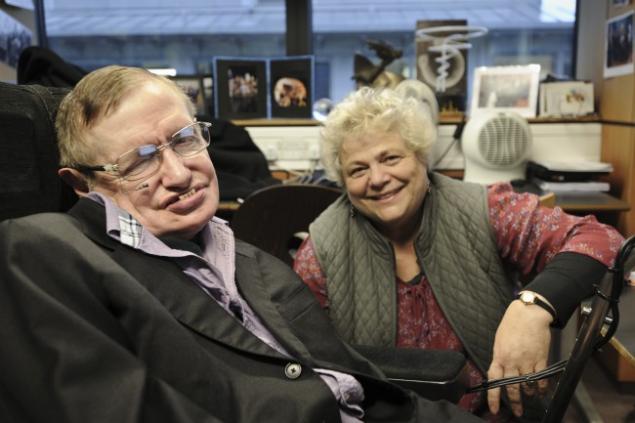As Stephen Hawking has managed to live more than 70 years with Lou Gehrig's disease
 Bashny.Net
Bashny.Net

In 2012, Stephen Hawking turned 70 years old, since three years have passed. Hawking is a Prime example of that when the doctors predict a quick demise, I've gotta move on. Thus, he managed to win his diagnosis for nearly half a century, leaving at the same time fatal. About this man and about his well-known voice, we wrote a lot. The recently released movie about him, and for his starring role Eddie Redmayne won an Oscar.
The famous theoretical physicist has devoted his ideas about black holes and quantum gravity to the General public. Most of their time in public, he was confined to a wheelchair because of the disease amyotrophic lateral sclerosis (als, ALS), also known as Lou Gehrig's disease. Since 1985, he was forced to communicate via computer system — which he operates with his cheeks — and needs constant care.
Although illness confined him to a chair, she did not break. For 30 years Hawking has held the post of tenured Professor of mathematics at Cambridge University. Currently he is research Director of the Centre for theoretical cosmology.

The majority of patients with als, called Lou Gehrig's disease after the famous baseball player who died because of this disease, received the diagnosis at age 50 years and died within five years since diagnosis. The diagnosis of Hawking set, when he was 21 and he was hoping to celebrate its 25th anniversary.
How Hawking managed to live so long while others die soon after diagnosis? This question was answered by Leo McCluskey, associate Professor of neurology and medical Director of the ALS Center at the University of Pennsylvania.
What is the BASS and how many forms of this disease do we know?

ALS, amyotrophic lateral sclerosis (als), Lou Gehrig's disease — motor neuron disease from the category of neurodegenerative diseases. Each muscle is controlled by motor neurons located in the frontal lobe of the brain. Synaptic and they are electrically connected to the motoneurons that are located in the lower lobe of the brain and motoneurons in the spinal cord. The neurons of the brain are called upper motor neurons; spinal cord — lower motor neurons. This disease causes a weakening of either upper motor neurons or lower, or both.
It is known that there are several options for BASS. One called progressive muscular atrophy, or PMA. The disease is isolated to the lower motoneurons. But pathologically, if you open the patient up, there are signs of damage to the upper motoneurons.
There is also primary lateral sclerosis — PBS — and clinically it looks like an isolated disorder of upper motor neurons. But it demonstrates a pathological disorder of lower motor neurons as well.
Another classic syndrome called bulbar ALS, or supranuclear progressive paralysis, weakening of cranial muscles, like language, facial and swallowing muscles. But he almost always extends to the muscles of the extremities.
These are the four classic motor neuron disorders that have been described in the literature. For a long time it was believed that these violations are limited to the motoneurons. But it became clear that it is not. It is now well known that 10% of patients with this disease develop degeneration in another part of the brain, like other parts of the frontal lobe that does not contain motor neurons or the temporal lobe. Thus, some of these patients may actually develop frontal-temporal dementia.
One of the misconceptions about als is that it is the only motor neuron disease, but it is not.
What did the case of Stephen Hawking about this disease?
The life of this man showed that Lou Gehrig's disease — is incredibly changeable disorder in many ways. On average people live two to three years after diagnosis. But that means half of people live longer, and therefore, there are people who live a very long time.
Life expectancy depends on two things. First, the motoneurons control the diaphragm — the breathing muscle. People often die from respiratory failure. Second, the deterioration of swallowing muscles can lead to malnutrition and dehydration. If these two things there, you can potentially live for a very long time, although the quality of life may be questionable. What happened with Hawking, is simply amazing.
He lived so long because she was sick still young and had juvenile diabetes?
Juvenile diabetes is diagnosed in adolescence, and I don't know him well enough to discuss. But it is certainly diabetic disorder that progresses very, very slowly. In my clinic there are patients who are diagnosed in adolescence, and they still live to 40, 50 or 60 years.

How prevalent is slowly progressing forms of ALS?
I think less than a few percent.
Do you think life expectancy Hawking is largely due to excellent care or biology, its concrete form BASS?
I think both. I'm not very well acquainted with him, so I don't know what operations he was subjected to. If he did artificial respiration, the case in biology — it defines how long the progressing neurodegenerative disease and how much time is devoted to life. If you have problems with swallowing you may get a feeding tube, which negates the problems of nutrition and dehydration. But biology a lot.
Hawking obviously has quite the active mind, and his previous statements show that his attitude is quite positive, despite his condition. Is there any evidence that lifestyle and psychological state affect the life of patients?
I don't think the longevity depends on it.
BASS still has no treatment. What we've learned about the illness recently that could help you to develop the best methods of treatment?
In 2006, it became clear that, like many other neurodegenerative diseases, the BASS is determined by the accumulation of abnormal proteins in the brain. 10% BASS genetically determined and depends on the gene mutation. There are certain genes that lead to certain types of BASS. Knowing the characteristics of these genes, we would know the mechanisms of their action on the brain, and therefore would be potentially a target for therapy. But while such therapies are not.
"He's exceptional, — said Nigel Lee, Professor of clinical neuroscience at king's College London, in 2002. I don't know anyone who has lived with ALS for so long. Unusually not only time, but also that the disease seems to have burned. He seems to be relatively stable. This kind of stabilization is extremely rare."
However, ten years later, when Hawking turned 70 in 2012, this reaction came from many other scientists. Anmar al-Chalabi from king's College London called Hawking's "extraordinary. I don't know anyone who would have survived during this time."
What makes Hawking different from the others? Just luck? Or transcendental nature of his intellect somehow stopped an imminent fate? No one knows for sure. Even Hawking, who is well versed in the mechanics behind the Universe, can not explain. "Perhaps my kind of BASS was formed due to poor absorption of vitamins", he said.
The Hawking argues that the focus on work, coupled with his disability gave him the years that were not available to others. Any other in a more physical field — say, the Lou Gehrig — could not function at such a high level. "I, of course, it helped that I have a job and that I was well looked after, said Hawking in 2011. — I was fortunate to work in theoretical physics, one of the few areas in which disability is not a major problem".
In any case, Hawking demonstrates incredible: with amyotrophic lateral sclerosis you need to fight and live. published
Source: hi-news.ru
Tags
See also
About a woman who is not cold
How to live to 100 years
Peter Thiel is going to live up to 120 years
Giant horns, oddly enough, do not interfere with the rhinoceros beetle flying
"There are, as we will no longer be." Oliver Sacks about life, death and the meaning of
New record: transplanted baboon heart pigs has been working for more than two years
They lived more than a century

















